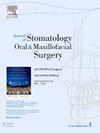Dexamethasone and concentrated growth factors on peripheral nerve injury: A clinic-relevant animal study
IF 1.8
3区 医学
Q2 DENTISTRY, ORAL SURGERY & MEDICINE
Journal of Stomatology Oral and Maxillofacial Surgery
Pub Date : 2024-10-01
DOI:10.1016/j.jormas.2024.101850
引用次数: 0
Abstract
Background
Mandibular nerve injury is a common clinical condition that affects clinicians’ management and patients’ quality of life. In the literature, there are various effective treatments available. The primary purpose of this study was to determine and compare the effects of dexamethasone and concentrated growth factor (CGF) on regeneration in patients with nerve trauma that mimics clinical situations.
Methods
In this study, 36 rats were divided into 3 groups: the control, dexamethasone and CGF groups. The inferior alveolar nerve was traumatized through the extraction socket after mandibular molar tooth extraction in each group.
Results
The data showed a decrease in the control (4.5–4), dexamethasone (3–2), and CGF (4–3) groups according to the histological injury severity score (HISS) results. Compared with those in the other groups, the number of degenerative axons and edematous areas observed via histological examination were significantly lower in the CGF groups. Similarly, compared with those in the control group, the nNOS and Neurofilament-H positivity in the dexamethasone group on the 30th day (2,2 to 1,1 respectively) was significantly lower. The positivity of all the primary antibodies in the 3rd and 30th day CGF groups was significant compared than that in the dexamethasone 30th day group.
Conclusion
According to the results of the analysis of the immunohistopathological and HISS data, the CGF groups exhibited greater regeneration than did the dexamethasone groups.
地塞米松和浓缩生长因子对周围神经损伤的影响:临床相关动物研究》。
背景:下颌神经损伤是一种常见的临床症状,影响着临床医生的管理和患者的生活质量。在文献中,有多种有效的治疗方法。本研究的主要目的是模拟临床情况,确定并比较地塞米松和浓缩生长因子(CGF)对神经创伤患者再生的影响:本研究将 36 只大鼠分为 3 组:对照组、地塞米松组和 CGF 组。每组在下颌磨牙拔除后通过拔牙窝对下牙槽神经造成创伤:数据显示,对照组(4.5-4)、地塞米松组(3-2)和 CGF 组(4-3)的组织学损伤严重程度评分(HISS)结果均有所下降。与其他组相比,CGF 组通过组织学检查观察到的退化轴突数量和水肿区域显著减少。同样,与对照组相比,地塞米松组在第 30 天的 nNOS 和 Neurofilament-H 阳性率(分别为 2.2 和 1.1)也明显降低。CGF第3天组和第30天组所有一抗的阳性率均显著高于地塞米松第30天组:根据免疫组织病理学和 HISS 数据的分析结果,CGF 组比地塞米松组表现出更强的再生能力。
本文章由计算机程序翻译,如有差异,请以英文原文为准。
求助全文
约1分钟内获得全文
求助全文
来源期刊

Journal of Stomatology Oral and Maxillofacial Surgery
Surgery, Dentistry, Oral Surgery and Medicine, Otorhinolaryngology and Facial Plastic Surgery
CiteScore
2.30
自引率
9.10%
发文量
0
审稿时长
23 days
 求助内容:
求助内容: 应助结果提醒方式:
应助结果提醒方式:


